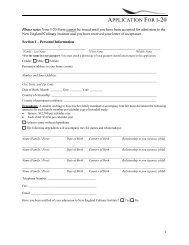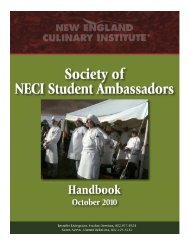Academic Catalog - New England Culinary Institute
Academic Catalog - New England Culinary Institute
Academic Catalog - New England Culinary Institute
Create successful ePaper yourself
Turn your PDF publications into a flip-book with our unique Google optimized e-Paper software.
Second Residency<br />
MOD 3 <strong>Academic</strong> Term 5<br />
Course Code Course Description<br />
Credits<br />
CMOR2000 Orientation 0.0<br />
CECA2307 Catering & Banquets PM 3.0<br />
CMCT2901 The Art of Cuisine 3.0<br />
CMAS2520 Flavors of the Mediterranean 4.0<br />
CMAS2502 Sensory Analysis 3.0<br />
MOD 4 <strong>Academic</strong> Term 6<br />
Course Code Course Description<br />
Credits<br />
CMCA2903 Advanced <strong>Culinary</strong> Techniques: 4.0<br />
Farm to Table<br />
CECA2702 Pastries, Confections & Plated 3.0<br />
Desserts<br />
HEAS2301 Nutrition 3.0<br />
CMCA2503 Meat Fabrication & Charcuterie 2.0<br />
CEPD2301 Professional Development 2 0.5<br />
CMBM2902 Fundamentals in Management 3.0<br />
Internship 2 <strong>Academic</strong> Terms 7 and 8<br />
Course Code Course Description<br />
Credits<br />
CMCA2006 Internship & Internship<br />
8.0<br />
Connection 1<br />
CMCA2007 Internship & Internship<br />
8.0<br />
Connection 2<br />
Third Residency<br />
MOD 5 <strong>Academic</strong> Term 9<br />
Course Code Course Description Credits<br />
DEOR3000 Orientation 0.0<br />
DEELXXX <strong>Culinary</strong> Elective #1 3.0<br />
DEAS3100 Chemistry & the Scientific 1.0<br />
Method<br />
DECT2611 Spanish I 2.0<br />
DECT2621 Spanish II 2.0<br />
DEAS4102 Product Development:<br />
1.0<br />
Entrepreneurship<br />
DEAS3500 Culture & Cuisine: International<br />
Flavors 2.0<br />
DECT3900 History & Culture: Asia, Mid- 1.0<br />
East, and the Americas<br />
DECS3000 Service Learning 2.0<br />
MOD 6 <strong>Academic</strong> Term 10<br />
Course Code Course Description<br />
Credits<br />
DEELXXXX <strong>Culinary</strong> Elective #2 3.0<br />
DECA3900 Contemporary Cuisine/Menu 1.0<br />
Development<br />
DEBM3800 Kitchen Management 2.0<br />
HMBM3802 Financial Management 3.0<br />
DECT3205 Our Global Society: Information<br />
Literacy and Communication<br />
3.0<br />
DEBM3401<br />
Extending the Season:<br />
Sustainability in Action<br />
2.0<br />
Non Resident Period <strong>Academic</strong> Terms 11, 12 and 13<br />
Course Code Course Description<br />
Credits<br />
DECA4003 Internship & Internship<br />
5.0<br />
Connection 1<br />
DECA4004 Internship & Internship<br />
5.0<br />
Connection 2<br />
DECA4005 Internship & Internship<br />
5.0<br />
Connection 3<br />
HMCT3100 Critical Issues in Leadership 3.0<br />
DMCT3300 Concepts in Natural Systems 3.0<br />
DMCT3400 Capstone 3.0<br />
Credit Hour Requirements<br />
Total minimum credit hours for the 39-month program<br />
are 140 credits. In the first and second year, 16<br />
semester credit hours are accrued during internship; 15<br />
semester credit hours accrued during the third year<br />
internship. In the final non-resident terms, 9 semester<br />
credit hours are offered online. As outlined in the<br />
Program Graduation section of this catalog, students<br />
transferring between terms or programs, students<br />
receiving advanced placement, or students who, upon<br />
approval of the <strong>Academic</strong> Advising Office, receive a<br />
waiver of any program requirement, may graduate with<br />
fewer than 140 semester credit hours.<br />
Bachelor of Arts in <strong>Culinary</strong> Arts, Online<br />
Program for Year 3 and 4<br />
The upper level of the Bachelor of Arts in <strong>Culinary</strong><br />
Arts is also offered in a fully online delivery format.<br />
The program consists of 72 weeks of instructional time<br />
(beyond the associate degree or other qualifying<br />
educational credits and industry experience); due to<br />
scheduled breaks between classes, the program can<br />
generally be completed within 24 months. The<br />
program is offered in 12 six-week online course<br />
segments, which are available on a revolving carousel<br />
schedule. This timeframe allows students to<br />
matriculate into the program at any point in the year.<br />
Successful participation in each course requires<br />
minimum of 30 hours per week, including time<br />
involved in online content and discussion boards, and<br />
time spent in reading, research, and completion of<br />
assignments and labs. Class size is a maximum of 25<br />
students per class section.<br />
To successfully complete the program, students must<br />
complete all 12 courses and sanitation certification<br />
requirement, as outlined under Graduation<br />
Requirements outlined below. The online Bachelor of<br />
Page 16






